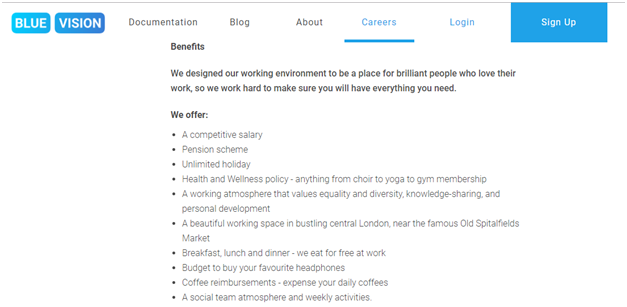Hiring top talent takes a lot of effort and patience. Especially in startups, recruitment can become a nightmare.
In the initial stages, startups may not have a dedicated HR team who can take care of the recruitment process. Therefore, founding members or CEOs might need to take on the role of recruiter. This is often a hurdle as many startup founders don’t possess substantial experience in HR.
In addition, a startup is often unable to provide the kind of perks and benefits that employees in bigger companies enjoy. So, recruitment in startups requires an alternate approach to wooing potential employees. In a candidate-driven job market, this is a matter of utmost importance.
Here are a few tips to make recruitment in startups easier than ever.
1. Inspire, Don’t Recruit
“Do you want to sell sugar water for the rest of your life, or do you want to come with me and change the world?”
According to reports, this question was enough for Steve Jobs to persuade John Scully, the President of Pepsi, to join Apple (a startup back in 1983).
When scouting talent for your startup, you can’t just go with the mindset of recruiting a candidate. You must inspire potential employees with the mission and vision you have set forth for your company. Since you probably can’t afford fat paychecks, this is your chance to get them excited about working in your company.
2. Promote Your Job Well
You need to treat potential recruits the same way you would treat your customers. In other words, you need to do everything in your capacity to win them over. The first step in doing this is to craft a tempting job description. This will perhaps be the first interaction between you and your potential employee.
Don’t just list a set of required qualifications, experience, and skills. Articulate them in such a way that it reveals why your company is an amazing place to work. Provide insights into the healthy and positive work culture you have created for your employees. The description has to reveal everything that sets your company apart from other employers in the market.
For instance, take a look at the careers page of Blue Vision Labs, a UK based startup. Under each job posting, they have outlined a set of benefits that new recruits will get when they join the company. In the benefits section, they have highlighted how the work culture is conducive to the growth of their employees.

Image via: bluevisionlabs.com
3. Listen to Employee Grievances
A clever way to lure talent is by identifying the problems that your employees face. Put yourself in the shoes of employees and try to understand their grievances. You can do this easily with the help of forums such as Glassdoor. It allows employees to review their employer on various metrics like benefits, pay package, and overall work culture.
You should look for complaints from people with the same job profile for which you are hiring. You can also find several other forums on Google where employees share the worst aspects of their jobs.
Once you have identified these pain points, think about what you can offer to these candidates to resolve their grievances. Make sure you include these points in your job description. It has to be inviting enough for them to want to quit their present job.
4. Build a Remote Team
The chances of potential employees staying a stone’s throw away from your office are slim. In fact, the perfect fit for your current job opening might be sitting in another corner of the world. Your job offer may not be tempting enough for them to pack their bags and relocate to a new place.
That is why you should consider recruiting remote talent. It gives your employees the flexibility to work from the comfort of their own space. Plus, think of all the money you will save in terms of office space, employee conveyance, etc. No wonder why remote hiring is becoming increasingly popular for recruitment in startups.
A classic example of this is Automattic, the parent company of WordPress. They have a global team that works remotely from 50 different countries all over the world.

Image via: automattic.com
Communication is Key
When hiring remote employees, there are a few things you need to keep in mind. Recruit only those candidates who have the experience working without supervision.
Once hired, make sure you stay connected with them constantly using tools such as Skype, Slack, Calendly, etc. And make sure you convey sensitive information only during a live conversation.
Schedule in-person team meets from time to time. This helps build a good rapport between team members. It also motivates employees to continue working for your company. After all, there is no substitute for face-to-face interaction.
4. Welcome Freelancers
Sometimes the salary that you offer might not be good enough to encourage a candidate to accept the job full-time. However, that doesn’t mean they are not a fit for the job. Consider hiring them as freelancers, i.e. on a part-time basis.
Working with freelancers works in your favor in multiple ways. Firstly, it saves you the cost of hiring a full-time employee. Secondly, it gives you a chance to test their skills before you offer them a permanent position in your company. This saves you the hassle of hiring someone and realizing they are not suited for the role.
Lastly, working with freelancers allows you to scale the volume of work up and down as needed. This is particularly useful when your company expects a seasonal boost in business. Platforms such as Upwork, Fiverr, etc. can help you recruit freelancers for any job from all over the world.
5. Search for Multitasking Wizards
Those who have worked in a startup know that many times, employees are required to don multiple hats at the same time. While employees are expected to perform certain duties on a daily basis, they may have to fulfill tasks beyond their forte. This happens due to a shortage of personnel and an overload of work.
So, when you hire for your startup, you should look for someone who is adept at multitasking. Of course, their skills must match with your requirements. But they should be sharp enough to tackle new challenges. Identify candidates who have a willingness to learn and adapt.
Final Thoughts
Recruitment in startups is a different ball game altogether. Age-old techniques of hiring won’t yield the best results. Rather, an innovative approach needs to be adopted to woo potential employees. Instead of hiring top talent, inspire them to work for your company despite all odds.
Do you know any other strategies that can make recruitment in startups easier? Please share your views in the comments section below.

